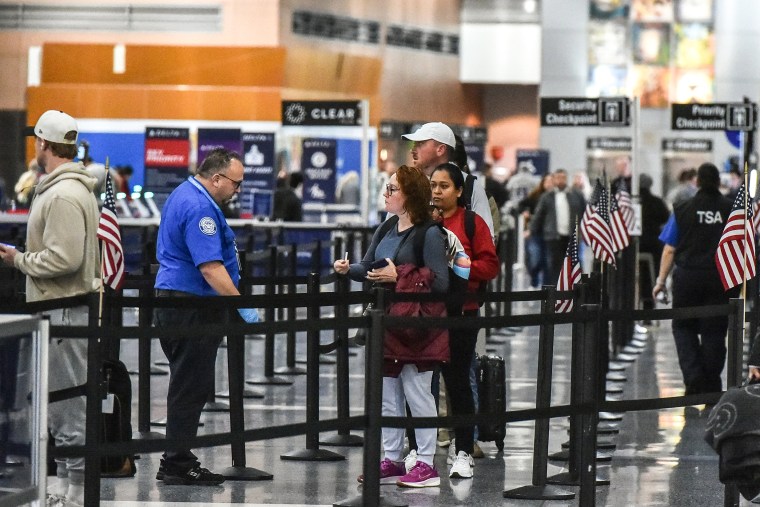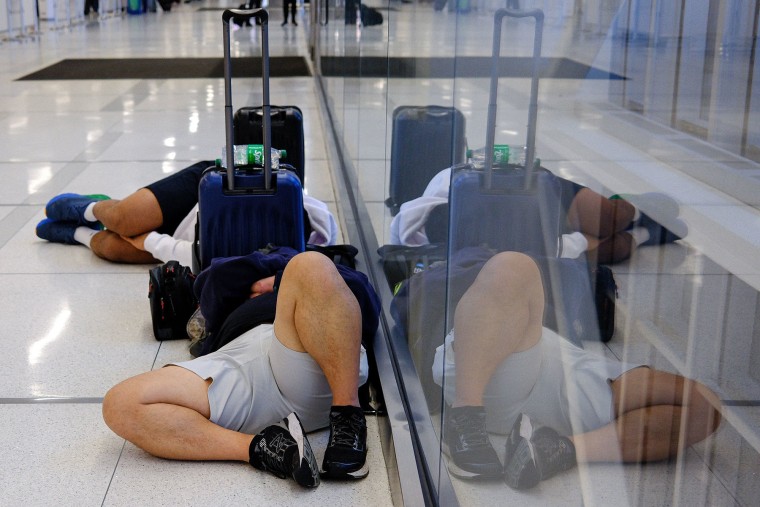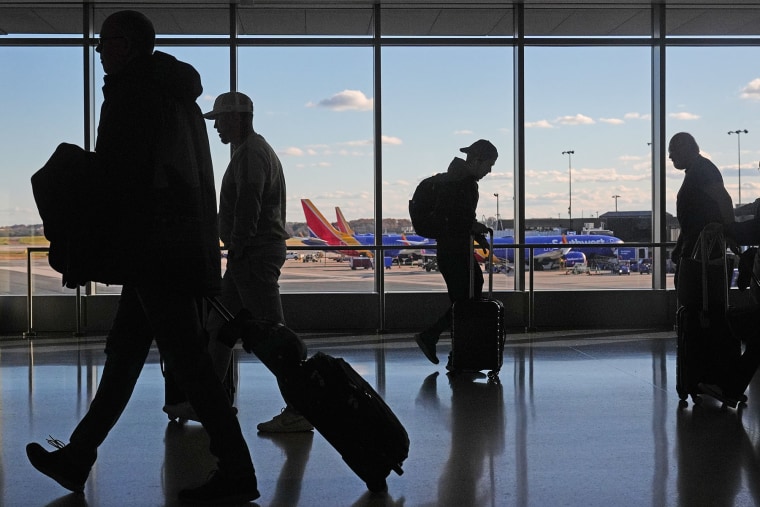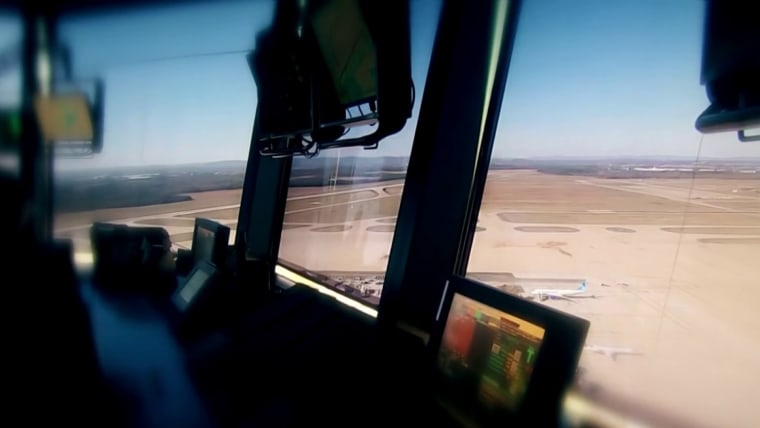There may soon be an end to the government shutdown that has been causing massive flight delays for weeks, but the travel nightmare caused by the political chaos in Washington showed no signs of abating Monday.
A day after senators approved a preliminary agreement to end the impasse, which is now in its 41st day, the Federal Aviation Administration announced it would continue to restrict commercial flights into and out of some of the country's busiest airports.
As of Monday morning, more than 1,400 flights had been canceled of the more than 25,000 scheduled, according to Cirium, an aviation analytics company. On Sunday, more than 2,600 flights were canceled, which amounted to about 10% of all scheduled flights. It's not clear how many were scheduled cancellations because of the shutdown and how many were canceled for other reasons, such as weather.
The number of scheduled flight cancellations is expected to increase to 6% on Tuesday, up from the initial 4% that started on Friday.
Lolita Honkpo, who was back at Newark Liberty International Airport in New Jersey on Monday after her flight to Atlanta was canceled on Sunday, said that was fed up with the government shutdown and that it was time to make "every person in a position of power uncomfortable about this."
"I think that, really, people should be calling their Congress people at this point," Honkpo said.
Shari and Mitchell Caspert and their new friend Susie Arons were also back in Newark airport, where they dropped off the Hertz rental car they used to drive home from Louisiana.
The trio, all of whom live in the Garden State, had been at the same wedding. They decided to drive home after discovering on Friday that it would be several days before they would be able to fly out of New Orleans International Airport.
“Our conclusion was that we had no confidence that we were going to get out on Tuesday, which was the earliest flight, so we really just have an action plan to get it done, and we did it," Arons said.
The airports where the FAA was restricting flights Monday include Chicago O’Hare International Airport; Hartsfield-Jackson Atlanta International Airport; Ronald Reagan Washington National Airport; Boston Logan International Airport; Los Angeles International Airport; Dallas Fort Worth International Airport; George Bush Intercontinental Airport in Houston; Harry Reid International Airport in Las Vegas; Denver International Airport; Phoenix Sky Harbor International Airport; Seattle-Tacoma International Airport; and two of the three major airports in the New York City metropolitan area.

All are airports that have been grappling with staffing shortages since air traffic controllers have been working without pay because of the shutdown.
Controllers are considered essential workers and not allowed to walk off their jobs — even if they're not being paid. But airports across the country have reported staffing shortages and flight delays since the start of the government shutdown.
From Oct. 1 through Nov. 9, some 5.2 million flyers had their travel disrupted due to flight delays because the airports did not have enough controllers to handle all the air traffic, the FAA reported.
But while just 11 flights were cancelled outright between Oct. 1 and Oct. 29 due to controller staffing issues, the number of cancelled flights skyrocketed to 4,162 between Oct. 30 and Nov. 9.
And 3,756 of those cancellations were between Nov. 7 and Nov. 9, when the FAA mandated flight reductions at 40 "high traffic" airports because there weren't enough controllers in the towers.

President Donald Trump, in a post Monday on Truth Social, threatened to dock the pay of air traffic controllers who have missed work and said he would recommend a $10,000 bonus for those who haven’t taken any time off.
“For those that did nothing but complain, and took time off, even though everyone knew they would be paid, IN FULL, shortly into the future, I am NOT HAPPY WITH YOU,” Trump wrote.
Nick Daniels, president of the National Air Traffic Controllers Association, who has steadfastly defended the controllers through the crisis, called his members "unsung heroes" during a news conference Monday.
“They are doing everything they can to hold this system together and be out there serving the American public during these trying times. Forty-one days without pay is unacceptable,” Daniels said. “Air traffic controllers should not be the political pawn during a government shutdown.”
Responding to Trump's post, Daniels said: "I’ll take anything that recognizes these hard-working men and women, but we’ll work with the administration on any issues that are out there."
"Air traffic controllers will continue to show up during this shutdown," he said. "They’ve endured the longest shutdown in American history, and every single day they absolutely, not only deserve their pay, they deserve to be recognized for what’s going on, so we’ll work with the administration through it."
Leanna Graves, 42, who made it home Monday to Louisville, Kentucky, after a six-day work trip to Springfield, Massachusetts, that included cancelled flights both there and back, said that while she is a Trump supporter, she also sympathizes with the controllers.
"I do think that the people that show up to work, I think that they should get compensation," Graves said. "So I applaud them for showing up when other people aren’t showing up."
But she's not planning to fly again for a while.
“I think if I was to travel anywhere else the rest of the year, I’m probably going to drive," she said.

Meanwhile, the airlines tried to reassure their customers they were doing everything they could to get passengers to their destinations.
"We are providing additional flexibility to our customers traveling to, from or through the impacted markets to change, cancel or refund their flights, including Delta Main Basic fares, without penalty during this travel period," Delta Airlines said in a statement.
David Seymour, the chief operating officer of American Airlines said in a letter to his workers, this "weekend’s operation was incredibly challenging for our industry, for our customers, for our airline and for you, our team members.
"We are trying to disrupt the fewest customers possible, with steps taken to protect international and hub-to-hub flying and limit disruptions to crew sequences," Seymour added. "However, given the unpredictable operating environment we’re in, we expect there will be continued cancellations and delays in addition to the FAA-required reductions."

